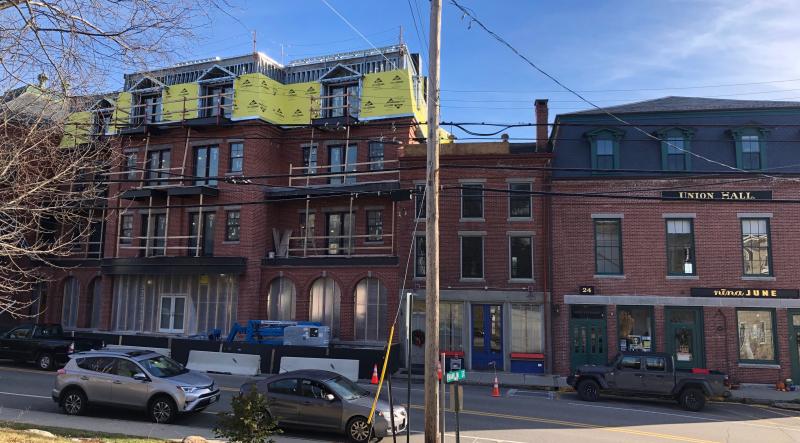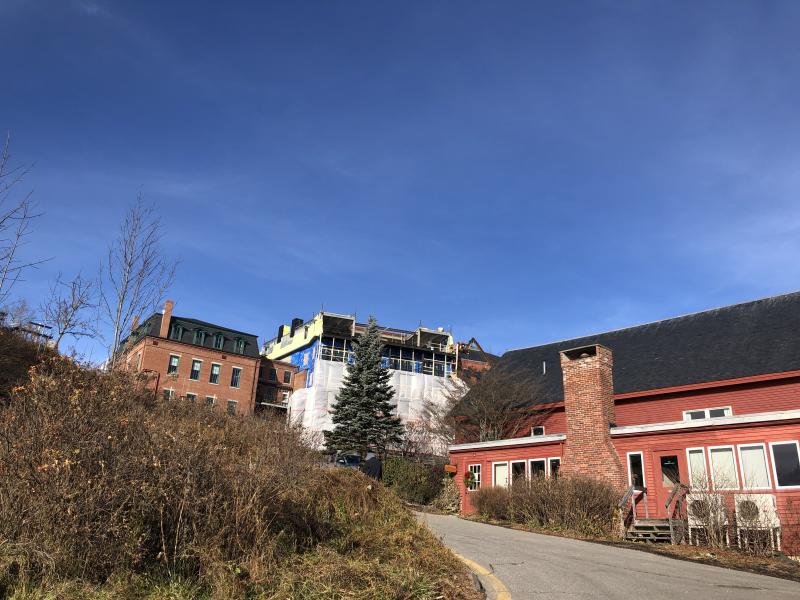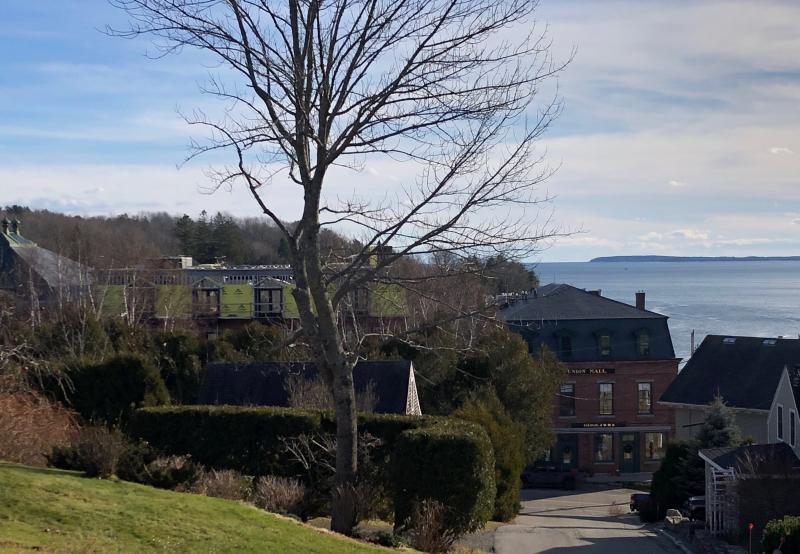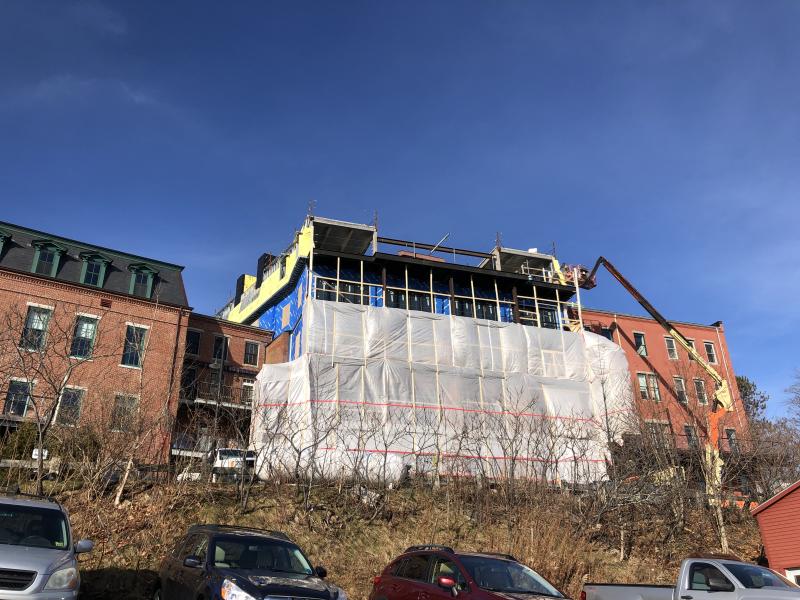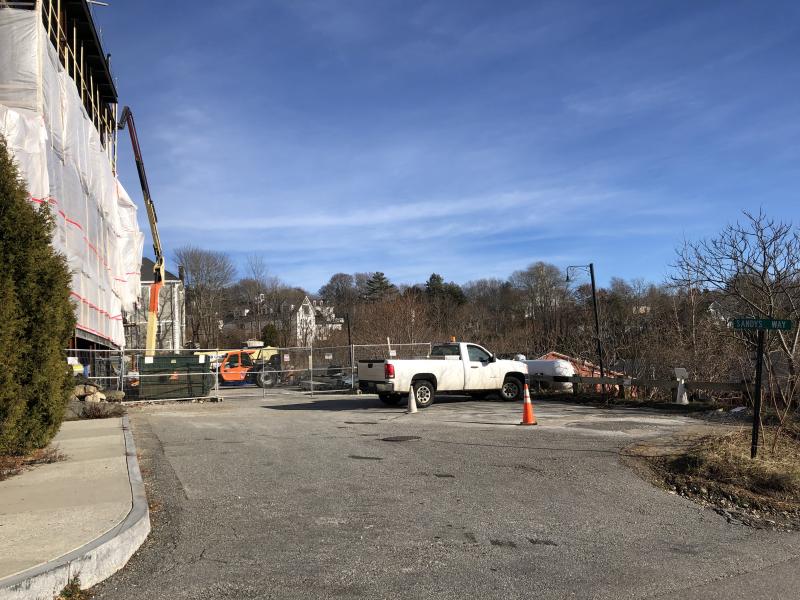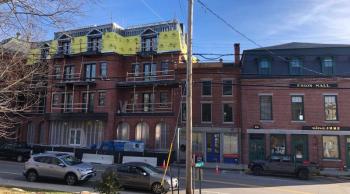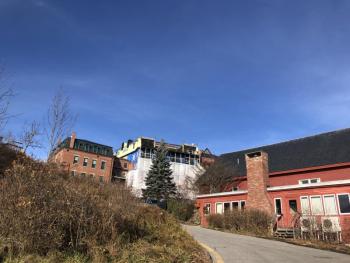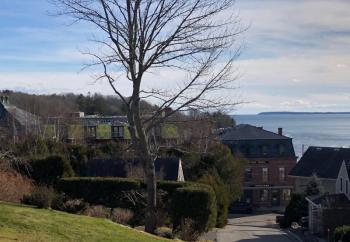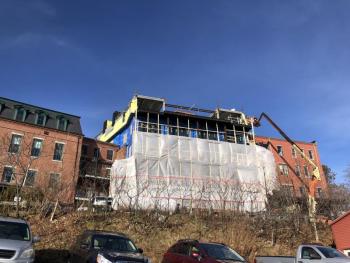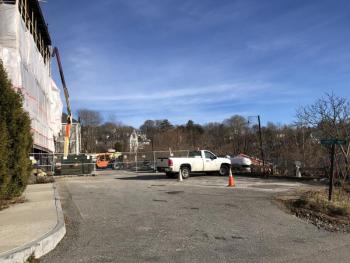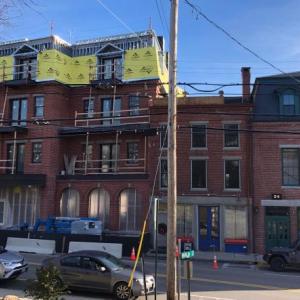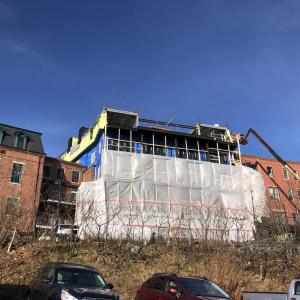Rockport hotel developer, plaintiffs hold firm to their positions in advance of court hearing
ROCKPORT — 20 Central LLC principal Stuart Smith appreciated a portion of the rulings made by Justice Bruce Mallonee Dec 2 concerning the ongoing court battle over his new 26-room Rockport Village hotel. But he objects to other orders issued by the Knox County Superior Court judge and said Dec. 3 that his interests would elevate the case to the state’s highest court, the Maine Supreme Judicial Court, if pending actions are not favorable.
“We would definitely appeal if doesn’t go in the direction we want it to go,” he said.
The lawyer for the Rockport residents who filed complaints against the town and its permitting approval of the hotel project said her clients remain resolute.
They will be asking for another stay or injunction to pause hotel construction until they are satisfied with a legal outcome, said Attorney Kristin Collins, who represents the plaintiffs. And, they too, are reserving the right for an appeal if the outcome of a mid-December court hearing does not favor their interests.
That hearing is to be held via Zoom December 15 at 1 p.m.
Justice Mallonee’s decision was filed at the end of last week, and he remanded the case back to the Rockport Planning Board with instructions to review two aspects of the town’s approval of the $5 million project. The first concerns parking; the second, architectural harmony.
He also wrote that the Dec. 15 hearing would address the issue of which land use ordinances — those last updated in 2018, or new ones, approved in 2021 — would be considered legally appropriate for the hotel permit process.
The case, which is a combination of two separate yet overlapping court complaints, had been initiated by the Friends of Rockport, John Priestley, Claire Tully David Barry, David Kantor, Mark Schwarzmann and Winston Whitney against the Town of Rockport, with 20 Central Street LLC as a Party-in-Interest.
The plaintiffs were appealing the town’s approval of the hotel building project, as well as disputing the town’s adherence to specific land use ordinances, at the expense of more recently voter approved ordinances.
In his decision, Mallonee acknowledged that the case is weighty for the community.
“This case is emotionally charged,” he wrote. “It involves issues of home, community life, local history, and divergent senses of esthetics, all of which could lead less genteel litigants and lawyers to provoke each other. That has not occurred. This, as the court again acknowledges counsels professionalism in marshaling and presenting this complicated material, it commends everyone involved (including the chair of the Planning Board, who exercised considerable patience in presiding at the meetings) for their forbearance and gentility. The court also notes the admirably clear and detailed decisions of the municipal boards and officials involved.”
It is also a procedurally complex case involving the town’s planning board, zoning board of appeals, code enforcement office, a 2020 town meeting vote of the electorate, a local business, Rockport citizens, and four or more attorneys. The case has cost the Town of Rockport $118,588.39 in legal fees to Bernstein Shur and Drummond Woodsum, as of Nov. 10.
While Rockport’s Town Manager Jon Duke declined to comment on the Dec. 2 decision and order, only to say that the town would wait for another hearing, the plaintiffs had issued a press release/statement on the outcome Dec. 3 via Attorney Collins.
They had said that the ruling agreed with most of their arguments, specifically the issue of hotel parking.
Parking for hotel guests and staff had been a topic for the town boards as they weighed commercial development in a small village, and available parking space. Sandy’s Way, the parking lot behind the brick block of buildings in Rockport Village, is owned by Stuart and Maryanne Smith, who also own the Shepherd Block and Union Hall, as well as the new hotel, referred to as the 20 Central building.
“Friends of Rockport has long held that all of the current parking spaces in Rockport have been allocated to prior uses, and that the Planning Board erred in assuming that 25 spaces were available for the hotel,” the news release said.
Additionally the news release said that the judge ruled positively on the Friends’ challenges to the proposed hotel balconies, in that his ruling stated that the Planning Board did not fulfill the land use ordinance requirements in reviewing the design.
“Perhaps more importantly, Justice Mallonee found that the town ordinances passed by popular vote of the citizens of Rockport on Aug. 18, 2020 do indeed apply to the proposed hotel,” the Friends and other plaintiffs wrote.
Those amendments limit the number rooms in any Rockport downtown hotel to 20 or fewer, and require a traffic study for projects.
“This is likely to significantly alter the design of the hotel, as well as the developer’s plans to utilize a satellite lot nearly a mile away on Route 1,” they wrote.
But Stuart Smith does not agree. Just as dusk was settling in Friday evening, Dec. 3, Smith spoke over the phone from the fourth floor of the 20 Central Street hotel, currently under construction.
“I am looking out at Rockport Harbor,” he said. “It’s beautiful.” To the west, he said he could see Ragged Mountain and Camden Snow Bowl, which will be lighted soon by night skiing. “It is a spectacular sunset,” he said.
Smith said he was looking forward to next year at this time, when the hotel was due to be completed (mid-summer 2022 is the current projection for opening, he said), and Rockport’s annual Holiday on the Harbor would be celebrated in the hotel, as well as down at Marine Park.
As for the judge’s recent decision, however, Smith said, “He got some things right and some things need to be rethought.”
He said: “I think his review of the site plan and support of the Planning Board issuing the permit was very good.”
He referenced Justice Mallonee’s decision concerningwhether the Planning Board adequately applied the town’s land use ordinance in considering adverse effects on the scenic view with the hotel’s construction.
“The hotel now fills the lot,” wrote Mallonee. “No view of Rockport Harbor remains to a person looking toward the hotel from any point on Central Street.”
He said the attempts by all parties to define the scenic view that had been in existence prior to 1970 reflected an unresolved exercise. The historical photos were neither oriented nor spatially legible enough to provide a satisfactory answer, he wrote.
“Had 20 Central designed its building with more model lateral dimensions it could have preserved at least a substantial sliver of view from the street to the harbor,” wrote Mallonee. “In doing so it might also have established a more rhythmic line to the sequence of adjacent buildings on the south side of Central Street.”
But, he said, the Planning Board did not err legally in allowing for maximum lot coverage at 20 Central Street.
Smith agreed with Mallonee, saying the town did not mandate leaving a gap between adjacent buildings (20 Central, Shepherd Block and Union Hall) because it is constructed in a zone where 100 lot coverage is allowed.
The land use ordinance was established to created a downtown village, “a row of store fronts,”said Smith.
“I’m glad he recognized that’s what the town wanted, had approved in the past and has clearly defined in the land use ordinance, which is what we, as well as Planning Board and Zoning Board of Appeals, felt it should be, ” he said. “We feel that’s a real good result and decision.”
But Smith disagrees the order for a parking review.
“I think he’s not quite clear on how the land use ordinance works as far as defining parking,” said Smith. “His concern about parking in general in Rockport is a good concern, which people need to be aware of, but it doesn’t apply to us.”
Smith said Mallonee’s focus on Union Hall was unnecessary because it, “has nothing to with this project.”
The ZBA had approved a parking plan allowing for 21 spaces behind the hotel on Sandy’s Way and 35 spaces at the satellite parking lot on Route 1, on property owned by the Smiths.
Mallonee cited a 2012 municipal decision to waive parking requirements for Union Hall, which currently is home to the Nina June restaurant, a community space on the second floor, and a top-floor apartment.
In 2012, Leucadia Corp. owned Union Hall and had converted it from educational use to commercial use.
But in his decision, Justice Mallonee noted vagueness in the municipal record when the Planning Board, in 2012, approved the change of use.
Because there was no supporting documentation of the traffic in and out of the Union Hall establishments, the 2020 Planning Board should have, during its review of the hotel application, considered all the overlapping burdens on limited downtown parking, said Mallonee.
Smith countered that how Union Hall satisfies its parking, “has nothing to do with this project.”
Union Hall “has no land around it, has no parking, never will have parking,” he said. “It has no land to have parking.”
Legally, patrons and residents of Union Hall do not have the right to parking in Sandy’s Way, “which is privately owned by the hotel, so the hotel has complete control over the parking lot,” said Smith.
That doesn’t mean they would be thrown off the parking lot, he said, but clarified that they don’t have the legal right to do so. They are to park on the street, just as patrons of the Rockport Opera House, are to do, he said.
Union Hall does not have to have 25 spaces, he said.
“It’s ironic that the only property that has private parking places is the hotel,” he said. “We own 60 parking spaces out back and none have anything to do with Union Hall.”
And, he said, the Planning Board did discuss the parking factor in depth during the hotel public hearings, he said.
“We still need off-site parking,” said Smith, adding that the satellite parking lot on Route 1 would be used for special events or overflow parking.
Would, then, Sandy’s Way parking be dedicated to hotel use?
“Pretty much,” said Smith. “We don’t mind other people parking there. As long as we have places for customers to park, we will let other people park there, too. That is us being nice neighbors.”
Smith also firmly stated that the design of the hotel fits in with the downtown village. He described former hotels in Rockport Village, now long gone. Two of them that had front porches and balconies, he said.
He cited the use of the word “harmoniously” and disputed Mallonee’s assertions, who wrote that the discussion and subsequent approval of the proposed hotel design, as discussed at a Feb. 27, 2020 Planning Board meeting, seemed to be based on the observation that other buildings ‘around the corner’ have decks of some sort.
“Without at least some discussion of the actual appearance of the hotel within its proposed context, as opposed to reference to an unquantified number of undescribed features of unspecified nearby buildings, the court cannot see that the requirements of the land use ordinance were fulfilled,” Mallonee wrote.
But Smith maintains that the use of balconies is harmonious.
“Others have balconies and we have balconies,” he said. “The new library has a new balcony out in front of it.”
Furthermore, he said, 20 Central designers were particular about designing the facade of the building, using bricks that match the historic bricks of the Shepherd Block (built in 1850) and Union Hall.
They also are using granite that matches the Shepherd Block. The foundation level is granite, and granite steps lead into the building from the street.
An entrance complaint with the American Disabilities Act will be constructed in front of the hotel, which will also be used for 20 Central Restaurant access, Smith said.
Gas lights that match the Shepherd Block and Union Hall are to be installed, he said, continuing to illustrate adherence to architectural harmony. And, he said, the Mansard roof matches the Mansard roof on Union Hall, down to the type of slate roof.
“We have spent a lot money making sure the face of this building matches the faces of the buildings next door,” said Smith. “Form follows function. This building is a hotel and hotels normally have doors to balconies. One thing we have learned [from the pandemic] is that people need fresh air.”
More importantly, he said: “This building will be open to the public, to Rockport citizens. It is not a private property condo project. It is open to the public to come here year-round and support the economy year-round.”
Smith said the owners of the two restaurants, Nina June and 20 Central, as well as the coffee shop sandwiched between, “are ecstatic for year-round. That’s the kind of thing you nee to have to have vibrant community.”
As for the ordinance amendments that Justice Mallonee will address Dec. 15, and their applicability to the hotel project, Smith said: “It is pretty clear they do not, based on state law.”
He said, “We are hopeful the judge will reconsider what we talk about at the next hearing.”
Meanwhile, the hotel construction continues, with crews working inside and outside. The hotel will probably be done by mid-summer, said Smith.
But Attorney Collins said her clients will pursue a stay or injunction on the construction.
“We are going to ask for stay,” said Collins.
That’s if Justice Mallonee does not issue one himself, she said.
The Rockport Planning Board is to convene next for a regular scheduled meeting December 16, but an agenda has yet to be posted.
Procedurally, there is much to consider at the Dec. 15 court hearing, and attorneys will continue to be busy even after any decisions are made then.
“I suppose if the remedy is not the remedy we seek, we would appeal his decision for a reconsideration of any judgment,” said Collins.
If parties are not happy with the decisions, they have the right to ask Justice Mallonee to reconsider his order. Beyond that, it is the Maine Supreme Judicial Court. In the past, other Rockport Village disputes involving the town’s permitting process have wound up being argued there, including the 1998 case of Patricia Lewis vs. the Town of Rockport, concerning the Maine Coast Artists building.
Reach Editorial Director Lynda Clancy at lyndaclancy@penbaypilot.com; 207-706-6657

